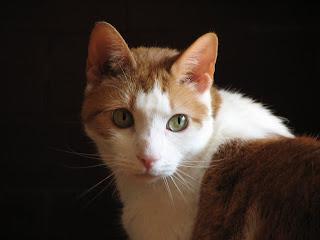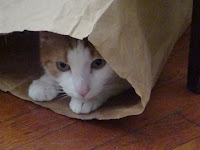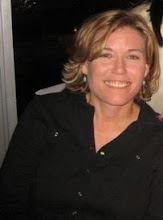
Some of you already know that on November 14, sometime between 2am and 6am, I lost my very dear special spirit & soulmate, Atticus (aka Atty, Atty Boy, Buddy, Buddy bo, boycat, ad nauseum). Though I have lost many people in my life, including my father, it is Atty's death that has touched me so deeply I can hardly fathom the loss. Maybe because he was a cat and such a positive, non-conflicted relationship in my life, I was able to experience his death purely as loss - no ambivalence, no ambiguity, no complication, no anger, no rage, no liberation, no guilt, nothing but loss & loss & loss. With his help, and with the help/reminders of some wonderful humans, I feel I have moved to a new understanding of the function of death/loss in our lives. I'm not sure I'll be able to articulate it, but I am willing to try by way of telling our story.
I should have known it. He has always been a teacher, an old soul. When I brought him home at six months of age, and Esther (4 months his senior & still thriving) would not stop hissing, growling, & attacking him, and I was at my wit's end, he took matters into his own hands (so to speak). He managed to escape the boundaries I had set up between them, and then sat on his haunches focused upon her, emanating acceptance, love, & kindness. He looked at her with soft eyes, heard her with ears pricked forward, inched closer to her whenever she relented for a second. Eventually, he was close enough to touch noses with her, and she smelled him all over & finally grew quiet. I was amazed at such certainty and wisdom in a kitten. Throughout their relationship, Esther may have been the alpha cat, but he was the spiritual leader & teacher when she would bother to listen, right up until the very end.
He was only midway through his 12th year, young for a domestic indoor cat. When he was 5 years old, he was diagnosed with hypertrophic cardiomyopathy, a congenital thickening of the heart muscle. It took almost a year to get the right combination of meds to stabilize his condition. After that, we enjoyed 4 solid asymptomatic years together. But this past March, I had to take him to the Emergency Vet to have him treated for congestive heart failure. Though I had to take him in for frequent check ups thereafter, he remained stable (with a new diuretic) for the next 8 months. On Monday, November 9th, it was evident that he was in congestive heart failure again, and we were at the Emergency Vet until 2am. I knew it would probably be downhill from there, but had no idea how quickly everything would unfold. That Wednesday, the big Nor'easter moved in, and was continuing to rage as we drove Atticus to the cardiologist on Thursday for what would turn out to be his last visit. They drained his heart & lungs again, and I left his next scheduled appointment intact, though I suspected already that he wouldn't be needing it.
With every pot, pan, and towel in use to catch water that was coming in at the windows, the storm seemed like perfect symbolism for the outrage of his dying. As Thursday turned into Friday, he stopped consuming anything - even the salmon & tuna juice he had been lapping at the day prior. When he began to have trouble walking, I moved into full panic mode. Thank goodness for a dear dear dear friend, who knows and loves Atticus, too. She shot off an email to her reiki group, asking that they work on Atticus long-distance. Her reiki teacher noted that she detected terrible fear in Atticus, and my friend suggested that I put my own feelings aside & project calming, fearless energy to him. We resolved to do this, thereby giving him permission to do whatever he needed. Throughout the day, we catered to his every need, projected calm & loving energy, and could feel his own energy move from fear to acceptance to almost welcoming death.

Atty had always loved the human voice. He especially liked when I read aloud, and once I discovered this, I had often done it just for him. Whenever I did, he would always sit in my lap or nearby, purr, and be soothed by it. Friday night, we decided to give him our voices right up until the end if it's what he wanted. We took turns reading to him, he sitting in my lap for a while, and then a few inches away on the sofa with eyes closed but ears attentive. At one point, Esther worked up the courage to pay him a visit. We held our breath as she approached him, smelled him, and looked upon him with large, wide, wondering eyes. This same cat who had always attacked when he returned from the vet must have also been absorbing our calm energy, and seemed to say her own farewell before she returned to her hiding place. We read until 2am, at which time he let it be known that he had had enough, and wanted to be left alone. We said our goodbyes as he settled down in one of his favorite spots under the kitchen sink, and went to bed. I woke at 6am, and felt the strangest calm in the air. I knew he had probably departed, and when this was confirmed, I cried for the first time since Monday night, when it had all started.
While I continue to feel the loss tremendously, and probably will for a long time, I am proud of my ability to put myself aside & enable a peaceful transition for him. I think he fully received my permission to go, lost his fear, and was returned to a state of freedom.
I can't express in words how much it means that I didn't have to intervene by having him "put down." It had already occurred to me that that procedure is probably necessitated by humans who can't let go, and a conversation with a colleague confirmed this for me. My colleague told me about a dog whom she had to put down, and how even after two separate injections of the drug, he would not die. It occurred to her then that he couldn't leave because she was not allowing it. When she mentally loosened her grip & let him know it was ok, he promptly departed.
To give the subject of death and dying due treatment would require many more entries than this one, so I don't want to get too far afield, but I do want to share a poem. The poem is one of the mystic odes of Rumi, and was featured in one of the last episodes of
Six Feet Under. I love this poem, have shared it with others in their own moments of loss, and think it provides great comfort.
Our death is our wedding with eternity. What is the secret? "God is One."The sunlight splits when entering the windows of the house.This multiplicity exists in the cluster of grapes;It is not in the juice made from the grapes.For he who is living in the Light of God, The death of the carnal soul is a blessing.Regarding him, say neither bad nor good,For he is gone beyond the good and the bad.Fix your eyes on God and do not talk about what is invisible,So that he may place another look in your eyes.It is in the vision of the physical eyesThat no invisible or secret thing exists.But when the eye is turned toward the Light of GodWhat thing could remain hidden under such a Light?Although all lights emanate from the Divine LightDon't call all these lights "the Light of God";It is the eternal light which is the Light of God,The ephemeral light is an attribute of the body and the flesh....Oh God who gives the grace of vision!The bird of vision is flying towards You with the wings of desire.
 1. Black Beauty, by Anna Sewell. On reflection, I realize that I can credit this book with a lot of things. First, it was the book that drew me to horses. Because of this book, I learned horseback riding at an early age and ended up working with horses in various capacities for years. I could ride western, English, and bareback. I did just about everything one could do with horses, including feeding, grooming, de-worming, leading trail rides, training, and rodeo riding. I taught horseback riding to beginners, trail riders (medium-advanced), and advanced students. I even considered going to a special equestrian college in Pennsylvania (before my love of theater overtook my love of things equestrian).
1. Black Beauty, by Anna Sewell. On reflection, I realize that I can credit this book with a lot of things. First, it was the book that drew me to horses. Because of this book, I learned horseback riding at an early age and ended up working with horses in various capacities for years. I could ride western, English, and bareback. I did just about everything one could do with horses, including feeding, grooming, de-worming, leading trail rides, training, and rodeo riding. I taught horseback riding to beginners, trail riders (medium-advanced), and advanced students. I even considered going to a special equestrian college in Pennsylvania (before my love of theater overtook my love of things equestrian).